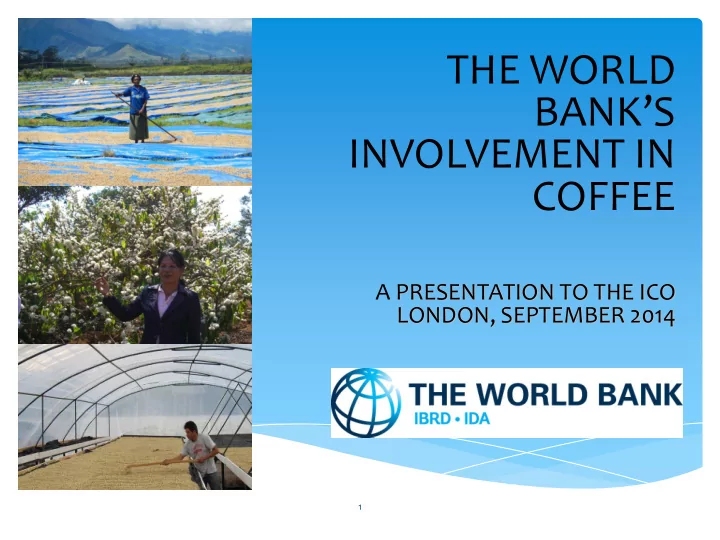

THE WORLD BANK’S INVOLVEMENT IN COFFEE A PRESENTATION TO THE ICO LONDON, SEPTEMBER 2014 1
Coffee Sector Engagement – Thematic Focus Raising productivity (climate-smart agriculture; improving the enabling environment) Linking farmers to markets and strengthening value chains Reducing risk and vulnerability (cross-cutting focus on gender, nutrition and longer-term risk management and improved resilience) Enhancing environmental services and sustainability (promoting landscape approaches) 2
How We Engage Provide support for national programs Combination of Analytical work Technical assistance Investment Project Financing (sector investment loans) Development Policy Lending (budget support) Differentiated approach across countries Selectivity, in partnerships with others 3
Some Examples of our Current Engagement East Asia and the Latin America Africa Global Pacific • Guatemala, Honduras, • Vietnam : Coffee • Burundi : • Coffee price risk Colombia, Panama and rejuvenation strategy; Mainstreaming management training Haiti : farm upgrading, support for new biodiversity protection module certification and Coffee Coordination in coffee landscapes - improved processing Board; scaling-up shaded coffee, through productive sustainable coffee watershed alliance projects practices. Forthcoming management, project focusing on certification; coffee • Mexico : replanting and sector policy dialogue mainstreaming promoting good on sector reforms and biodiversity protection agricultural practices significant stand-alone in productive through credit lines coffee investment landscapes project in preparation • Papua New Guinea : • Haiti : coffee supply Support for improving • South – South chain risk assessment productivity and Knowledge Exchange sustainability, market with Colombia linkages and ( Burundi, Rwanda and institutional Ethiopia ) strengthening • Kenya : coffee supply • Indonesia : Technical chain risk assessment Assistance 4
Accessing Project Finance World Bank Loans and Grants to Governments Non- Research Private Sector Farmers Governmental Institutions & Organizations Organizations 5
A Project Example: Papua New Guinea - Productive Partnerships in Agriculture Organizing Linking them farmers with a market Investing in production Technical 6 and marketing assistance
PNG: Productive Partnerships in Agriculture ∗ Public-private alliances to improve productivity and market linkages ∗ Coffee component co-financed by IDA (approx. $27.5 million) and IFAD ($7 million) ∗ Typical partnership comprises of a lead partner (exporter, processor, NGO), co-partners (various service providers) and a groups of farmers ∗ Project provides grants to partnerships through a competitive process ∗ Individual partnerships have between 300 – 1,500 smallholder farmers ∗ Support for farm upgrading, certification, improved processing, a range of institutional strengthening, capacity building and management activities and rehabilitation of access roads in areas serving the partnerships 7
PPAP Results to Date - Coffee ∗ Currently 19 partnerships involving 13,791 coffee farmers; end of project target is 30,000 farmers ∗ 12,679 coffee gardens profiled; tools distributed to farmers ∗ 32 nurseries constructed; 192 model gardens established ∗ 18 groups have applied for certification and 5 have been certified ∗ 3,500 farmers have received some training on agronomic practices; 16% are women ∗ 2,755 farmers have received training on post-harvest aspects ∗ 699 farmers, including 229 women have received personal viability training ∗ 59 extension workers trained; 8% are women 8
Recommend
More recommend